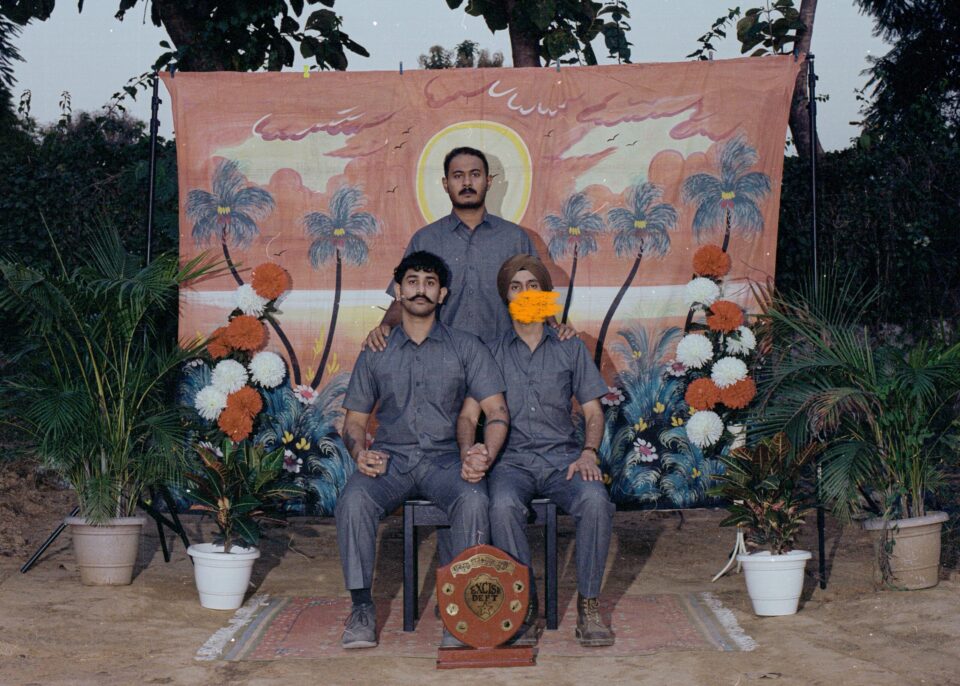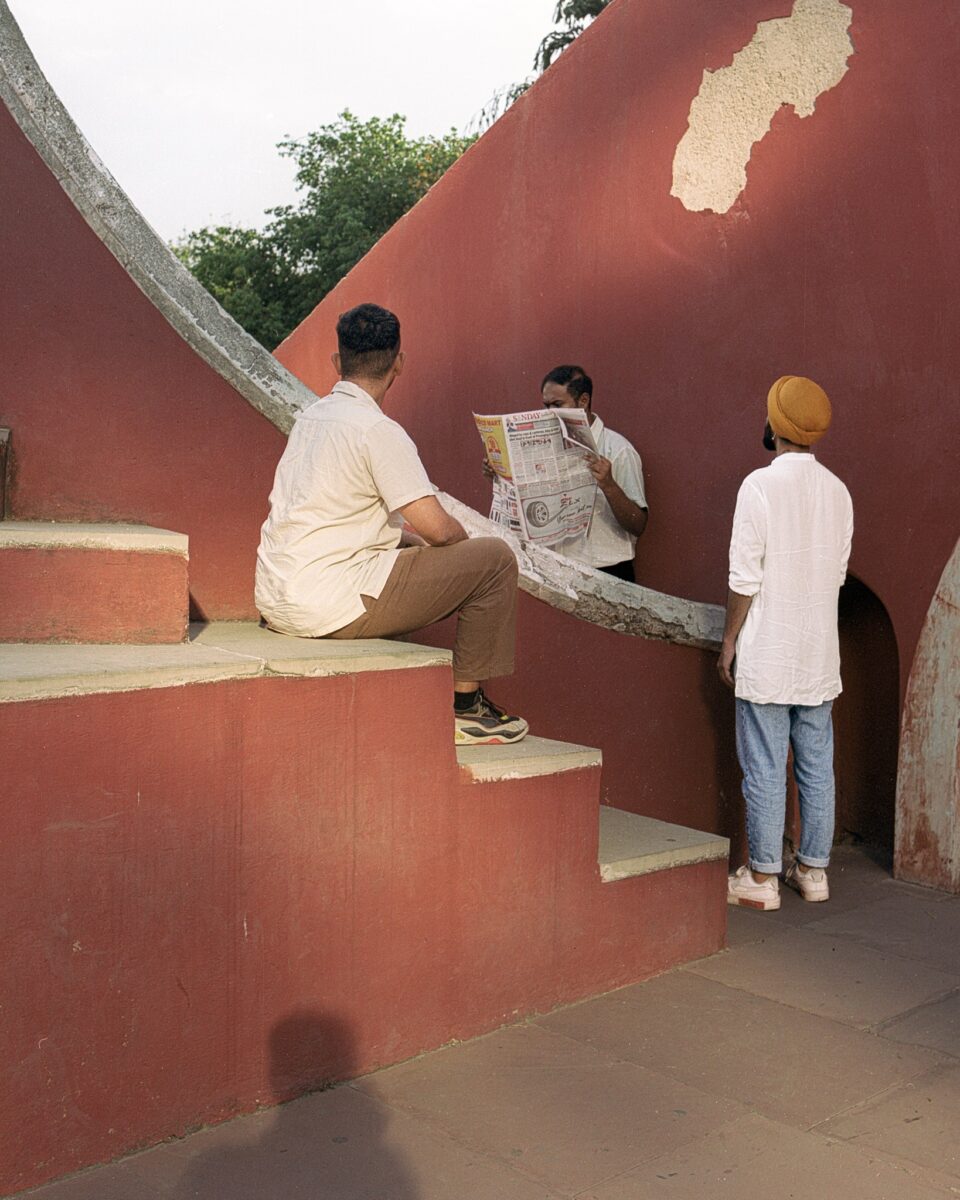Excise Dept: ‘It Was Important To Create Strong, Bold Contrasts’
From an immersive website experience to a roving sound rooted in hip-hop, the Mumbai/New Delhi group’s debut album ‘Sab Kuch Mil Gaya Mujhe Vol 1’ is a powerful artistic statement like few others in the country

Mumbai/New Delhi group Excise Dept in the artwork for 'Sab Kuch Mil Gaya Mujhe Vol. 1.' Photo: Courtesy of the artist
If Excise Dept’s single “Billo” from 2023 was a breakout release of sorts, Sab Kuch Mil Gaya Mujhe Vol 1 – the collective’s debut album – is a swift left turn into becoming a boundary-pushing act in India.
At the center of the 10-track album is chaos, absurdity, experimentation and more. There’s a message too, if you expected that sort of thing from an album – it’s on the notion of identity. Multidisciplinary artists Karanjit Singh, Rounak Maiti, Siddhant Vetekar and Andrew Sabu have created one of the wildest collections of songs with Sab Kuch Mil Gaya Mujhe Vol 1. In Punjabi, Hindi and Bengali lyrics and a mostly unplaceable sense for genre blends (mostly hip-hop, as Excise Dept will admit), the album was released on Aug. 15, with shows in Mumbai and New Delhi that lived up to the act’s hyper performances which may have taken place in mainstay venues but broke away from the idea of just getting up on a stage and performing.
In an interview with Rolling Stone India, the artist collective speak about the making and launch of Sab Kuch Mil Gaya Mujhe and more. Excerpts:
Rolling Stone India: What was the launch show in Mumbai like for the album? It felt like some kind of breakthrough and level up for Excise Dept.
Siddhant Vetekar: The launch show was incredibly fun, super high energy and pretty much exactly how an artist would want their album launch to go. Couldn’t be more grateful for our communities in Bombay and Delhi for showing up with so much love and selling out both venues. Especially as a group that’s remained largely indoors, building our work for the last four years, it feels fulfilling and an indication that we’re (hopefully) on the right path. Also felt very rewarding to platform such talented supporting artists in each city.
What was the starting point for an album project like this? It was more than just building on the oft-heard [tag] “Sab Kuch Mil Gaya Mujhe” right?
Rounak Maiti: Sounds super stereotypical, but in all honesty, this was a completely organic thing that emerged from the time we were all spending together. The only difference is that the context was the pandemic, so we were reckoning with a lot of newness, as well as isolation, death and sociopolitical changes in our country. The headspace we were living in was shocking and absurd on a day-to-day basis. I think the album is our way of untangling the absurdity, addressing media, politics, history, the music industry, pop culture, cinema, memes, religion — the undefinable mess of it all.
The need of the hour, for us, is to make stuff that is expressive, free, emotionally vulnerable – to cope with the times. “Sab Kuch Mil Gaya Mujhe” was initially just a cool audio sample that we appropriated as our tag, but over time, it seemed to become a general kind of philosophy. One of self-actualization and self-determination (we are all largely self-taught and do everything on our own). There’s something very euphoric and optimistic about the phrase, which stands in stark contrast to the otherwise dark themes we’re exploring in the music itself. It rings true as a motto for all of us as artists and as people – to act with a sense of confidence, assurance and abundance.
How do the three of you agree upon the kind of sonic and visual direction you want Excise Dept to go in, especially for a wide-ranging, unpredictable album project of this scale? What’s the common ground between you all, you’d say?
Karanjit Singh: I think over time we have learned to trust in each other’s intuitions and take cues from each other over the direction to take. With visuals especially, the consensus was to stay clear of classic hip-hop tropes, or if leaning into them, incorporate them into the kitsch and the absurd. In an age that’s overwhelmed with content, we want to put out quality and not empty quantity, this I think has helped us slow down and really figure out the shape of what to make.
Vetekar: I think that’s why this album took as long as it did — it took four years of incubation, experimentation, discussion, playing, making mistakes, fighting, laughing – to figure out how to distill all of this chaos into a sound that nobody is doing other than EXCISE DEPT.
There’s an interactive, immersive website that went up along with this album. I like how it’s one of those things that is best viewed on desktop browsers, kind of a throwback to how websites were just works of art. Did you want to bring something like that back, or was it more about just finding that this was the right medium to present what you had for the project?
Singh: We wanted a space where our listeners could go to dive deeper into the world from which the music came out of, also it became a way to engage with our audience further. Everything on the site has been scanned – from our personal archives to collected magazine articles from the late 80s and early 90s. Certainly the idea of a person sitting on a desktop clicking away at links in a cyber cafe is an image that delighted us!

“Life’s a Game” had a really incredible music video. What is the process like for finding these narratives for your visuals?
Singh: I had been following Mr. Babbar for the past decade on YouTube since I first stumbled upon his work through the Sikh internet grapevine. RM [Maiti] and I decided to reach out to him on a whim, not even knowing if he still practices magic or if he is even around. To our surprise, he was not only ready to participate in the video but was super enthusiastic about helping bring some of the ideas alive to tape. At some point in the pre-production of the shoot, Mr. Babbar told us about how when he was a kid, he would stand in front of the mirror, take a marker and draw a beard and mustache onto his reflection – and [the] image of this in the video, of Babbar saab standing in front of the mirror, laughing maniacally, felt like a nice full circle moment. Making “Life’s a Game” was certainly a big learning moment for us, and a realization of the type of narratives we want to build through our music and visuals – about real people and with real people.
On another note, I was particularly interested in flipping the narrative of the “tortured Sikh” in our previous single release from the album, “CTRL DEL ALT” into something that was more playful and had more heart to it. The Sikh in “Life’s a Game” is one with a magic wand, who can conjure up new realities.
So far, the album’s received a great response, especially for songs like “Birhada” and “Baaro Maala.” What kind of messages have you guys got about it?
Singh: It’s interesting you mention those songs specifically especially because both of them have a nice multilingual exchange in Bengali and Punjabi unfolding – this I think is something that’s speaking to people. While we did not intentionally think too much about our separate backgrounds, folks have been quick to bring up how Bengal and Punjab despite having separate histories and traumas have been connected through time.
Maiti: We’ve released each song with a lot of intention and the stark contrast between both these tracks (which were both singles in the lead up to the album) was wholly intentional as well. While “Birhada” is a melancholic tribute to Shiv Kumar Batalvi, “Baaro Maala” is diametric opposite – a sort of moshpit-inducing call to action, pure fun, a total rejection of the music scene and its usual trappings. But that’s part and parcel of ED as a project – be bold and unapologetic, but also keep time for inward reflection.
The kind of “schizophrenic” take on identity that’s described in the press note, which also extends to the sonic palette, what kind of challenge (if any) was there in bottling that into the studio recording format?
Vetekar: Everything was written, recorded and produced entirely in our home studios across Delhi and Bombay. I think schizophrenia is something we kind of thrive on. It’s true that this can introduce clashes and friction in a band environment, but somehow I think EXCISE DEPT is a celebration of those differences. The fact that we can keep shapeshifting so easily relieves us of the burden of categorization. If something isn’t working, we change gears very quickly. Sonically speaking, it was important to create strong, bold contrasts.
Maiti: While one could sit and unpack the lyrical themes for hours on end, loaded with nuances of language, the music also functions as a pure, visceral sonic experience. At some level, it’s just music and there’s nothing that deep about it all.
Singh: Lyrically for me, it was to create these distinct characters that all spoke to a schizophrenic Sikh identity of our time. The Sardar that you crack your 12 o’clock jokes about, the Sardar with militant thoughts, the Sardar that’s been defeated by the world, the Sardar that’s making you tap your feet and dance, the Sardar that rejects all these identities to fight to be truly seen for once.
What’s coming up in 2024 now that this album is out? Are there more shows? More visuals?
More of everything!







